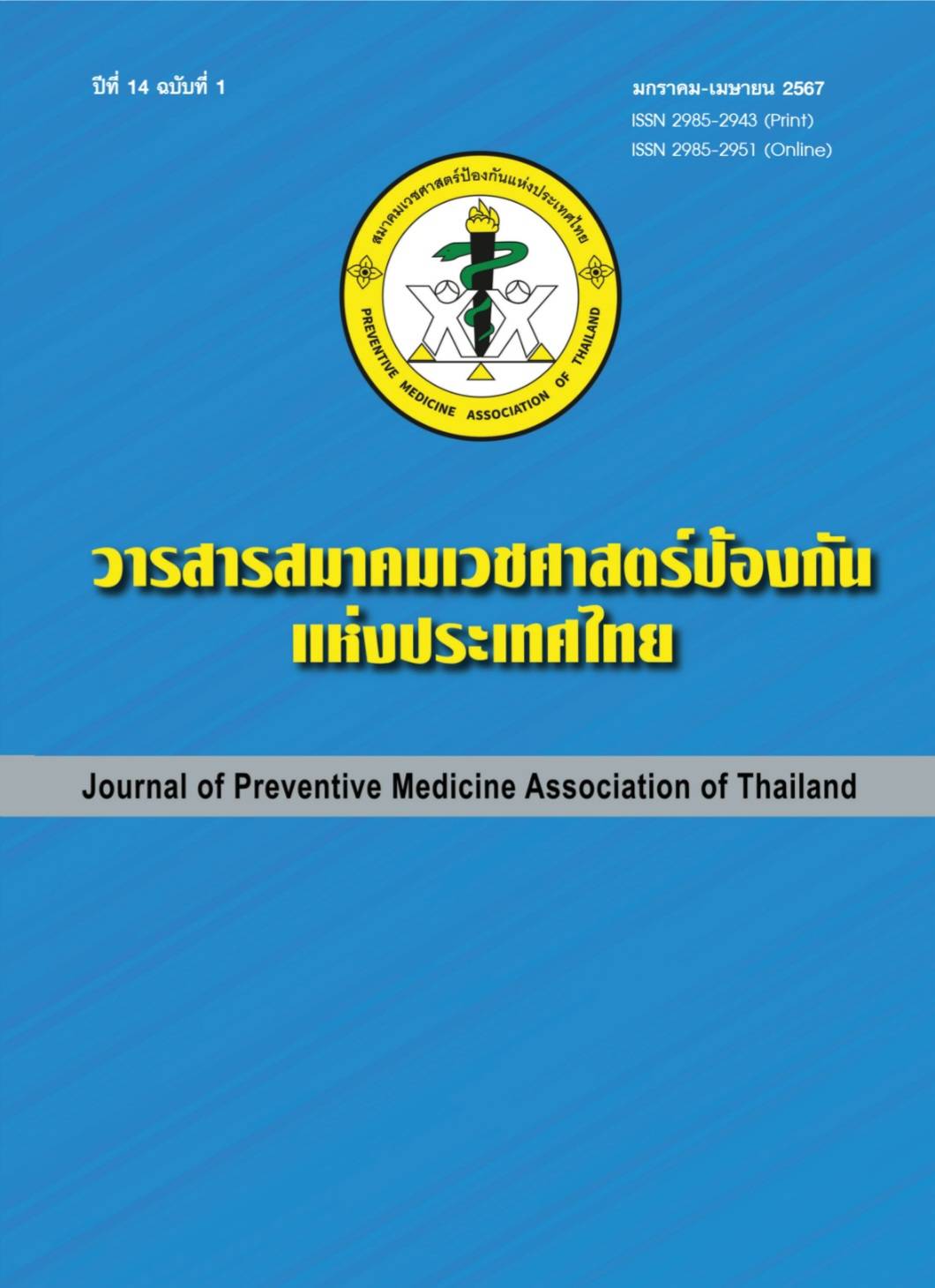Proposal for the Development of Lifestyle Medicine for Sustainable Prevention and Control of Non-communicable Diseases (NCDs) in Thailand
Keywords:
lifestyle medicine, non-communicable diseases (NCDs), strategy for prevention and control of NCDs, health behavior changeAbstract
All countries around the world, including Thailand, are struggling to control and prevent chronic non-communicable diseases (NCDs), which cause a global death rate of up to 41 million people per year. Lifestyle Medicine (LM) is an evidence-based medical practice that helps individuals and communities with comprehensive lifestyle changes (including nutrition, physical activity, stress management, sleep hygiene, risky substance avoidance, and social connectedness) to help prevent, treat, and even reverse disease progression by addressing the underlying root causes of health problems, which is recognized as an important approach for effective prevention and control of NCDs. Thailand has developed Lifestyle Medicine starting with the production of preventive medicine doctors specialized in Lifestyle Medicine in 2022 and is developing the production of LM non-physician health personnel to work as a team with lifestyle medicine doctors in developing quality lifestyle medicine services equitably accessible to all Thai effectively. In the initial stages of development, there are gaps and challenges, which this article reveals using McKinsey's 7S concept as a framework for analysis. The authors propose for academic development and knowledge management in Lifestyle Medicine to close gaps that have not yet been implemented or are in the process of being implemented but have not yet reached the goals as recommended by the 5-year National Strategic Plan for NCDs Prevention and Control (2017 - 2021).
References
World Health Organization. World health statistics 2020: monitoring health for the SDGs, sustainable development goals. Geneva: World Health Organization; 2020.
Haileamlak A. The impact of COVID-19 on non-communicable diseases. Ethiop J Health Sci 2022;32(1):1-2.
Global Wellness Institute. Defining wellness policy: November 2022. Florida: Global Wellness Institute; 2022.
United Nations Development Programme (UNDP), World Health Organization (WHO), Ministry of Public Health of Thailand. Prevention and control of non-communicable diseases in Thailand: the case for investment [Internet]. 2021 [cited 2024 Feb 26]. Available from: https://shorturl.asia/nH5lR
กระทรวงสาธารณสุข. ข้อมูลเพื่อตอบสนอง Service Plan สาขาโรคไม่ติดต่อ (NCD, DM, HT, CVD) ปีงบประมาณ 2566 [อินเทอร์เน็ต]. 2566 [เข้าถึงเมื่อ 26 ก.พ. 2567]. เข้าถึงได้จาก:https://shorturl.asia/vlLXz
กรมกิจการผู้สูงอายุ. สถิติผู้สูงอายุ [อินเทอร์เน็ต]. 2567 [เข้าถึงเมื่อ 20 ม.ค. 2567]. เข้าถึงได้จาก: https://www.dop.go.th/th/know/1
ตนุพล วิรุฬหการุญ. การป้องกันและรักษาโรคอ้วน (เอกสารประกอบการบรรยายหลักสูตรนักบริหารระดับสูงด้านเวชศาสตร์วิถีชีวิต รุ่นที่ 7). นนทบุรี: สมาคมเวชศาสตร์ป้องกันแห่งประเทศไทยและกรมอนามัย; 2566.
วิชัย เอกพลากร, บรรณาธิการ. รายงานการสำรวจสุขภาพประชาชนไทยโดยการตรวจร่างกายครั้งที่ 6 พ.ศ. 2562 - พ.ศ. 2563. กรุงเทพฯ: คณะแพทยศาสตร์โรงพยาบาลรามาธิบดี มหาวิทยาลัยมหิดล; 2564.
Guthrie G. Definition of lifestyle medicine. In: Rippe JM, editor, Lifestyle medicine. 3rd ed. Boca Raton: Taylor & Francis Group; 2019. p.961-68.
Yeh BI, Kong ID. The advent of lifestyle medicine. J Lifestyle Med 2013;3(1):1-8.
Bodai BI, Nakata TE, Wong WT, Clark DR, Lawenda S, Tsou C, et al. Lifestyle medicine: a brief review of its dramatic impact on health and survival. Perm J 2018;22:17-25.
Sadiq IZ. Lifestyle medicine as a modality for prevention and management of chronic diseases. J Taibah Univ Med Sci 2023;18(5):1115-7.
Viroli G, Kalmpourtzidou A, Cena H. Exploring benefits and barriers of plant-based diets: health, environmental impact, food accessibility and acceptability. Nutrients 2023;15(22):4723.
Li D. Effect of the vegetarian diet on non-communicable diseases. J Sci Food Agric 2014;94(2):169-73.
WHO Regional Office for Eastern Mediterranean. Promoting physical activity to prevent and control non-communicable diseases [Internet]. 2024 [cited 2024 Jan 25]. Available from: https://shorturl.asia/OB75m
Intarakamhang U, Macaskill A, Prasittichok P. Mindfulness interventions reduce blood pressure in patients with non-communicable diseases: a systematic review and meta-analysis. Heliyon 2020;6(4): e03834.
Basnet S, Merikanto I, Lahti T, Männistö S, Laatikainen T, Vartiainen E, et al. Associations of common chronic non-communicable diseases and medical conditions with sleep-related problems in a population-based health examination study. Sleep Science 2016;9(3):249-54.
Naren T, Cook J, Armstrong F, Manger S. Lifestyle interventions in the management of substance use disorder. AJGP 2022;51(8):560-4.
Holt-Lunstad J. Positive social connection: a key pillar of lifestyle medicine. J Fam Pract 2022;71(1 Suppl):S38-40.
Benigas S, Shurney D, Stout R. Making the case for lifestyle medicine. J Fam Pract 2022; 71(Suppl 1):S2-4.
Chevinsky J, Chirumamilla S, Caswell S, Nyoni LM, Studer K. Clinical preventive medicine, integrative medicine, and lifestyle medicine: current state and future opportunities in the development of emerging clinical areas. AJPM Focus 2024;3(1):100166.
สำนักงานเลขาธิการแพทยสภา. ประกาศสำนักงานเลขาธิการแพทยสภา ที่ ๗/๒๕๖๖ เรื่อง การยื่นคำขอสมัครสอบเพื่อหนังสืออนุมัติและวุฒิบัตรแสดงความรู้ความชำนาญในการประกอบวิชาชีพเวชกรรม สาขาต่างๆ พ.ศ. ๒๕๖๖ [อินเทอร์เน็ต]. 2566 [เข้าถึงเมื่อ 20 ม.ค. 2567]. เข้าถึงได้จาก: https://tmc.or.th/index.php/News/Announcement/1029.
Gorin SS, Davis CL. Implementing behavioral medicine in a lifestyle medicine practice. In: Mechanick JI, Kushner RF, editors. Creating a lifestyle medicine center. Springer: Cham; 2020. p.161-79.
พรเทพ ศิริวนารังสรรค์, ภูดิท เตชาติวัฒน์. เวชศาสตร์วิถีชีวิต: เวชปฏิบัติแนวใหม่แบบสหสาขาวิชาชีพ เพื่อการขับเคลื่อนระบบสุขภาพไทยสู่การบรรลุเป้าหมายการพัฒนาที่ยั่งยืน. วารสารการสร้างเสริมสุขภาพไทย 2565;1(4):456-63.
สำนักสารนิเทศ สำนักงานปลัดกระทรวงสาธารณสุข. ข่าวในรั้ว สธ. : กรมอนามัย-สมาคมเวชศาสตร์ป้องกันแห่งประเทศไทย ลงนามความร่วมมือ พร้อม ชู 6 วิถีชีวิต สร้างคนไทยสุขภาพดี [อินเทอร์เน็ต]. 2566 [เข้าถึงเมื่อ 20 ม.ค. 2567]. เข้าถึงได้จาก: https://pr.moph.go.th/?url=pr/detail/2/02/182951/
มูลนิธิศาสตราจารย์นายแพทย์สมบูรณ์วัชโรทัย. โครงการพัฒนาหลักสูตรเวชศาสตร์วิถีชีวิตสำหรับผู้ให้บริการทางด้านสุขภาพที่ไม่ใช่แพทย์ (เอกสารประกอบการอบรมเพื่อทดสอบหลักสูตรเวชศาสตร์วิถีชีวิตสำหรับผู้ให้บริการทางด้านสุขภาพที่ไม่ใช่แพทย์). นนทบุรี: มูลนิธิศาสตราจารย์นายแพทย์สมบูรณ์วัชโรทัย; 2566.
คณะอนุกรรมาธิการสร้างเสริมสุขภาวะป้องกันก่อนรักษาภายใต้คณะกรรมาธิการการสาธารณสุข วุฒิสภา. รายงานสรุปการประชุมสร้างเสริมสุขภาวะป้องกันก่อนรักษาในคณะกรรมาธิการการสาธารณสุข วุฒิสภา. กรุงเทพฯ: สำนักงานวุฒิสภา; 2566.
ศูนย์ปฏิบัติการกรมอนามัย. โครงการจัดทำและขับเคลื่อนยุทธศาสตร์การดูแลสุขภาพเฉพาะบุคคลด้วยเวชศาสตร์วิถีชีวิตเพื่อพิชิตสุขภาพดีอย่างยั่งยืน (Lifestyle Medicine : Personalized Healthcare Strategies) ปีงบประมาณ 2566 [อินเทอร์เน็ต]. 2566 [เข้าถึงเมื่อ 25 ม.ค. 2567]. เข้าถึงได้จาก:https://doc.anamai.moph.go.th/index.php?r=str-project/view&id=6289
Tejativaddhana P. The development of lifestyle medicine in Thailand: new multidisciplinary practices in managing NCDs to achieve SDGs. Paper presented at The 13th International Conference on Public Health among Greater Mekong Sub-Regional Countries; 2023 Jul 2; Hue City: Hue University of Medicine and Pharmacy; 2023.
มูลนิธิศาสตราจารย์นายแพทย์สมบูรณ์วัชโรทัย. โครงการจัดการความรู้และพัฒนาวิชาการด้านเวชศาสตร์วิถีชีวิต (คจวช.) (เอกสารเสนอต่อคณะผู้บริหาร สสส. สำนักสร้างเสริมวิถีชีวิตและสุขภาวะ) เมื่อ10 สิงหาคม 2566. นนทบุรี: มูลนิธิศาสตราจารย์นายแพทย์สมบูรณ์วัชโรทัย; 2566.
Downloads
Published
How to Cite
Issue
Section
License
Copyright (c) 2024 สมาคมเวชศาสตร์ป้องกันแห่งประเทศไทย

This work is licensed under a Creative Commons Attribution-NonCommercial-NoDerivatives 4.0 International License.
บทความที่ลงพิมพ์ในวารสารเวชศาสตร์ป้องกันแห่งประเทศไทย ถือเป็นผลงานวิชาการ งานวิจัย วิเคราะห์ วิจารณ์ เป็นความเห็นส่วนตัวของผู้นิพนธ์ กองบรรณาธิการไม่จำเป็นต้องเห็นด้วยเสมอไปและผู้นิพนธ์จะต้องรับผิดชอบต่อบทความของตนเอง






